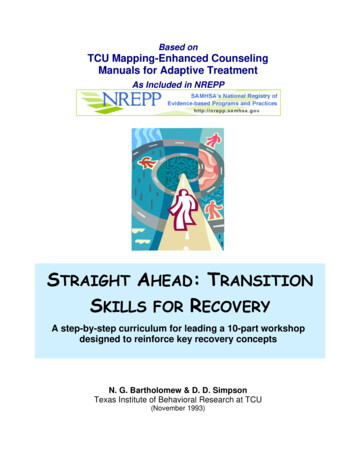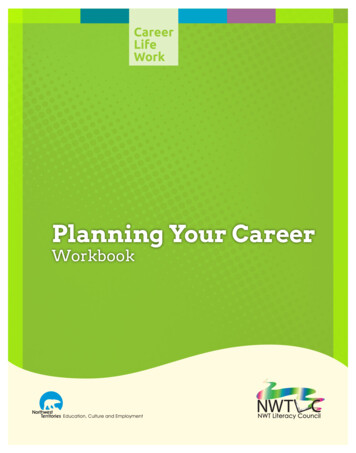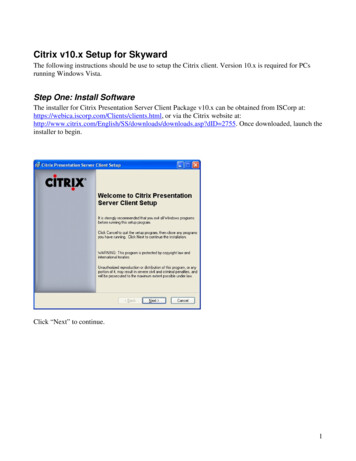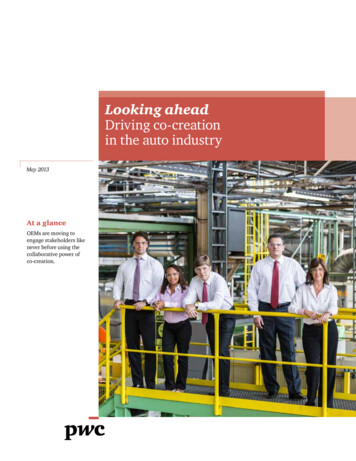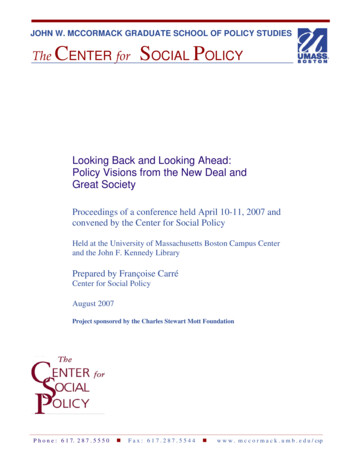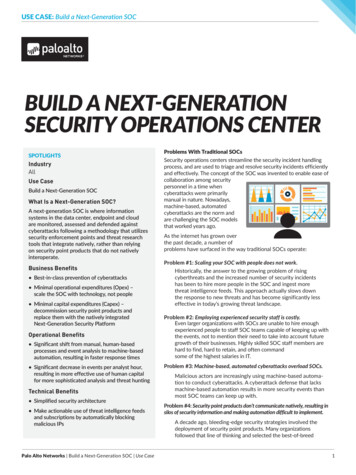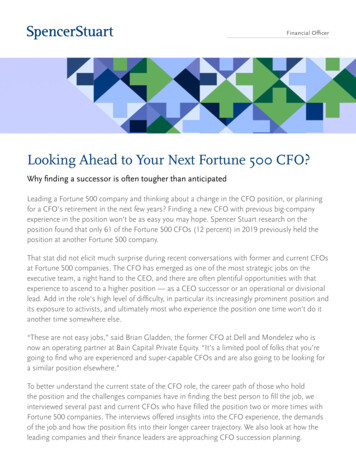
Transcription
Financial OfficerLooking Ahead to Your Next Fortune 500 CFO?Why finding a successor is often tougher than anticipatedLeading a Fortune 500 company and thinking about a change in the CFO position, or planningfor a CFO’s retirement in the next few years? Finding a new CFO with previous big-companyexperience in the position won’t be as easy you may hope. Spencer Stuart research on theposition found that only 61 of the Fortune 500 CFOs (12 percent) in 2019 previously held theposition at another Fortune 500 company.That stat did not elicit much surprise during recent conversations with former and current CFOsat Fortune 500 companies. The CFO has emerged as one of the most strategic jobs on theexecutive team, a right hand to the CEO, and there are often plentiful opportunities with thatexperience to ascend to a higher position — as a CEO successor or an operational or divisionallead. Add in the role’s high level of difficulty, in particular its increasingly prominent position andits exposure to activists, and ultimately most who experience the position one time won’t do itanother time somewhere else.“These are not easy jobs,” said Brian Gladden, the former CFO at Dell and Mondelez who isnow an operating partner at Bain Capital Private Equity. “It’s a limited pool of folks that you’regoing to find who are experienced and super-capable CFOs and are also going to be looking fora similar position elsewhere.”To better understand the current state of the CFO role, the career path of those who holdthe position and the challenges companies have in finding the best person to fill the job, weinterviewed several past and current CFOs who have filled the position two or more times withFortune 500 companies. The interviews offered insights into the CFO experience, the demandsof the job and how the position fits into their longer career trajectory. We also look at how theleading companies and their finance leaders are approaching CFO succession planning.
LO OKING AHE AD TO YOUR NE X T FOR TUNE 50 0 CFO?%12Fortune 500 CFOs in2019 who previously heldthe position at anotherFortune 500 company28%Fortune 500 CFOs in2019 with any previousCFO experience%4Outgoing CFOs in2019 who took a CFOposition at anotherFortune 500 company%20Outgoing CFOs in 2019who were promotedto CEO or generalmanagementSPENCER S TUAR TThe CFO challengeConsidering the CFO’s important and highly visible role communicating with boards and investors, it’s not surprising that many Fortune500 boards and CEOs rate “past CFO experience” as the top criteriafor a possible replacement. More than ever before, the CFO is a strategic operational partner and perhaps the executive position under thebrightest spotlight after the CEO.However, that prominence is a key reason it’s so hard to find experienced people to fill the position. CFOs almost by definition findthemselves in the crosshairs of both investors and boards. Indeed,not only does a CFO have to have strong financial chops, but he orshe must also be skilled in effectively communicating the company’sfinancial well-being and its strategic context to the board, investorsand the broader public, while also influencing decision making withthe CEO and executive team. It’s a rare skill set that comes with alot of pressure.“Helping the organization achieve good results for investors is themost important long-term indicator of success in the role,” said SteveBramlage, CFO of Casey’s General Stores, who served almost fiveyears as CFO at Aramark after a three-year stint at Owens-Illinois.“However, that does not eliminate the need to productively managerelationships with the CEO, the board, shareholders and operatingpeers. If you struggle to influence these stakeholders, you will likelystruggle in the role regardless of how much technical expertise in areaslike accounting or treasury or operations someone has had previously.”Furthermore, when the CEO faces pressure, much of that cascadesdown to the CFO as well; our research has found that when a CEOleaves, more than half the time the CFO is out within two years.“You’ve got to add value pretty quickly in this role,” said Fareed Khan,the former CFO at Kellogg, U.S. Foods and United Stationers who isnow COO and CFO at Parallel (formerly Surterra Wellness). “If youmiss quarters, or you have controls issues, it’s one of those thingswhere a company just can’t live with it.”The pressure is particularly acute for new CFOs hired externally intoalready-difficult situations, said Dave Anderson, the former CFO atHoneywell. When the numbers come in short of expectations, theCFO often bears the brunt of the questioning, putting that person intowhat he called a “vulnerable position.”And as activist investors become a more common presence, CFOs’ability to position their companies both strategically and financially todrive the most value and to communicate with all stakeholders hasbecome critically important. A new CFO does not get a long honeymoon period.PAGE 2
LO OKING AHE AD TO YOUR NE X T FOR TUNE 50 0 CFO?“As CFO, you are often carrying a lot of the weight of that company’sworld on your shoulders,” Anderson said. “There may be marketplacereputation risks, and confidence and morale issues inside the organization. All eyes are on you, and you have to get up to speed and gainconfidence and credibility from the organization while also reestablishing confidence and credibility from investors and others.”The CFO role and the career pathOf the 90 outgoing Fortune 500 CFOs in 2019, 18 (20 percent) eitherbecame a CEO or were promoted to general management positions.Only four (4 percent) moved to a different CFO position withinanother Fortune 500 company.A key reason these moves are so rare is that successful CFOs areoften looking upward for their next position. It is not uncommon forthe CFO to be a leading internal candidate for CEO — 18 percent ofFortune 500 CEOs in 2019 previously held the CFO role — or alternatively in a top operational or divisional role.With this in mind, a sitting Fortune 500 CFO may not be attractedto an outside CFO opportunity unless it offers at least a morestrategic role, if not a path to CEO. Attractive and lucrative opportunities have also arisen in the past decade in private equity, whereexperienced CFOs can take a more operational position without thepublic scrutiny.“To entice someone to leave a sitting CFO role, the valueproposition has to be very compelling, in terms of getting to play arole in creating the strategy and driving the growth of the business,”said Starbucks CFO Patrick Grismer, who previously held the positionat Hyatt and Yum! Brands. “They’d have to see the opportunity asbeing more substantial — including a much larger company — orproviding the opportunity to play a broader role or participate in asignificant turnaround.”The steep learning curve that comes with joining a new company canalso give external candidates pause about taking a new job, evenwithin a familiar industry. Long experience at a company gives one acertain level of intuition about how things are going that is harder tounderstand when you start somewhere new. Joining a new companycan mean making a leap of faith that the new situation will be onewhere you have sufficient time to learn the company and its culture.Companies have their own “internal languages” and a way of doingthings that make sense for them but might not for another company,SPENCER S TUAR TPAGE 3
LO OKING AHE AD TO YOUR NE X T FOR TUNE 50 0 CFO?said Dave Denton, who took both the internal and external paths tohis two CFO positions. He spent more than a decade at CVS Healthbefore taking the CFO job there; after eight years at CVS, he becameCFO at Lowe’s.“A job at a new company doesn’t have a technical learning curve asmuch as it requires you to learn the specific dynamics of the business,” Denton said. “There’s a balance when you come in. You bringsome best practices that can be applied, but there are also best practices at your new company, and you have to try to understand how itworks and why.”Finding your next CFO fromthe outsideIf you need to go externally for a CFO, where do you look? Of theexternally sourced Fortune 500 CFOs hired in 2019 with previousexperience as a CFO, 76% moved to a larger company. Further, nearlyhalf (47 percent) had previously managed a company or divisionbefore becoming CFO. While traditional finance backgrounds like divisional and deputy finance (82 percent of externally hired CFOs), FP&A(38 percent), accounting/control (35 percent) and treasury (35 percent)remain common backgrounds, it’s clear that strong CFO candidateshave profiles that go much wider than mere finance acumen.“You need some level of breadth across the finance discipline,”Grismer said. “But as important, if not more important, is that youhave the leadership impact to be able to influence the executive leadership team as well as the interpersonal skills to form an effectivepartnership with the CEO.”Skills are only part of the puzzle of finding an external candidate,however. When considering the challenges of the positions discussedearlier, an external candidate’s interest in and availability for a newCFO role ultimately may simply come down to individual factors thatare difficult to pinpoint at a broad scale: a recent empty nester who’sfar from retirement but open to a relocation for the first time in years;a previous CFO who lost the job after a merger; an internal candidatefor the CEO job who didn’t get it; someone in semi-retirement whocan’t resist the opportunity for one last challenge.Grismer was drawn to Starbucks’ iconic global brand and turnaroundopportunity, and had reached a point in his life where he had the flexibility to make a physical move. Khan moved to Parallel because of aninterest in the health and wellness sector coupled with the opportunity to play a more leading role in a fast-growing company. Anderson,SPENCER S TUAR TPAGE 4
LO OKING AHE AD TO YOUR NE X T FOR TUNE 50 0 CFO?who has held the CFO position at five different companies in fivedifferent sectors, says he has been drawn by the challenge of joiningcompanies in need of transformation.“I’m a big believer in the role — I view it as an opportunity to supportan organization that’s in need,” Anderson said. “You’re providingmore than just the tourniquet, but actually developing a path forward,helping to stabilize the organization.”When looking to hire your finance lead externally, personal relationships (or a search partner with those relationships) and a knowledgeof their relative openness to taking on a different CFO job can be key.Several CFOs we interviewed said they were drawn to their CFO positions at least in part because of some type a connection to the CEOor the board.“You absolutely will weigh internal factors at a particular company —its mission, values and culture, the CEO, board dynamics, companyperformance and value creation potential,” Steve Bramlage said.“But CFOs are like anyone else making a career decision — personaland family situation, financial position, how you want to keepworking, etc.”Internal succession planning for CFOThe challenges of finding experienced external candidates may onlyincrease in the wake of the COVID-19 pandemic. On one hand, thegrowing acceptance of remote work arrangements may help drawcandidates not interested in relocating. At the same time, there couldbe an acceleration of retirements as CFOs bow out following one ofthe most tumultuous years on record.As a result, a greater spotlight is shining on internal succession plans.Similar to what we commonly see in plans to fill the CEO position,more companies today are committed to developing an internalbench of future CFO candidates who can also push the overall teamto perform at a higher level.Several CFOs told us that selecting the internal candidate whoseweaknesses you already know — and can address with developmentand team support — can be a more effective path than seeking outoutside candidates.“Internal succession has to become more important,” Gladden said.“There has to be a willingness to find the right step-up candidates,and for the CFO to own the grooming of a successor and spend a lotof time working with them.”SPENCER S TUAR TPAGE 5
LO OKING AHE AD TO YOUR NE X T FOR TUNE 50 0 CFO?As CFOs, CEOs and CHROs develop internal succession strategiesfor the finance function, they can embrace three strategies to betterprepare their current talent for the CFO role.Identify successors with strong leadership andinterpersonal skillsWith leadership and communications skills both so important to aCFO’s success, identifying future leaders with strong interpersonalrelations and helping them to cultivate those skills must be acentral consideration.“An internal candidate must have really strong communicationsskills,” Denton said. “They have to be able to think dynamically ontheir feet. Try to get them some experience doing that, even if they'renot talking to investors. It's a good skill set to develop, because theyhave to do that actively every day as CFO.”Some of this can be trained or taught; our interviewees cited executivecoaches and special business school classes as valuable investments,as well as internal experience working across units and geographies.Offer experience in a variety of rolesWhile traditional finance backgrounds such as accounting and treasury remain common pathways to CFO, working across disciplinescan give internal successors a breadth of experience that builds theirstrategic capabilities and helps them gain credibility within the organization as they ascend to lead the function. The finance leaders wespoke with also pointed to the importance of giving rising candidatesexposure to communicating with both the board and with investors.Bruce Besanko, the former CFO at Supervalu who also held the position at Kohl’s and OfficeMax, said that a variety of roles early in hiscareer helped him prepare for the CFO role.“I got used to moving from unit to unit, and each unit had its ownculture as well,” Besanko said. “You figure out how to get along with avariety of different communication systems and cultural systems.”SPENCER S TUAR TPAGE 6
LO OKING AHE AD TO YOUR NE X T FOR TUNE 50 0 CFO?Prepare candidates for exposure to investorsInvestor relations is a primary skill for CFOs, yet giving internalsuccessors access to that experience can be difficult to achieve. It’snot uncommon to bring a direct report into earnings calls or otherinvestor meetings, and it’s also possible to give a potential successorresponsibilities related to a specific investor relations initiative.“Part of what CFOs need to think about with their own teams is creating opportunities where they can get in front of investors,” Khan said.“You need to help accumulate knowledge in many areas.”Of course, there’s no preparation better than finally being the CFOand facing investors for the first time.“It’s hard to build those skills without being in front of investors anddrinking from the fire hose,” Gladden said. “And as much experienceas you can get beforehand, it's different when you're the one. Thebuck stops with you in terms of those communications with investors.That's the hardest thing to learn until you have the job.”SPENCER S TUAR TPAGE 7
LO OKING AHE AD TO YOUR NE X T FOR TUNE 50 0 CFO?our approach tocfo successionplanningAs more companies seeinternal succession as thepath to filling the CFO role,it is critical to develop astrong bench of internalcandidates with welldeveloped leadershipcapabilities and the ability toadapt and grow with the joband the business.Building on work we’ve longdone assisting in CEOtransitions, Spencer Stuarthelps companies as theyapproach successionplanning in functional roleslike CFO. Our approachincludes three key elements:123Start earlyCompanies can find themselves in a bind when aCFO’s departure is rapidly approaching, yet there is alimited sense of which internal candidates are ready.Early formal assessments of internal candidates canprovide high-potential internal talent the time theyneed to develop new skills and experience throughspecial assignments or developmental roles.Use external benchmarksUse external benchmarks. Benchmarking externaltalent can provide a sense of internal CFOcandidates’ relative strength compared to executiveswith relevant experience at other companies, and canhighlight any important experience gaps.Build a development planA robust assessment can identify individuals’development needs and their ability to step into amore complex role and demanding role, and cansuggest specific opportunities for development andsupport. Many companies find it useful to tap anoutside expert, who can provide an appropriateprocess for a specific set of development needs.SPENCER S TUAR TPAGE 8
About the AuthorsTricia Clifford (Chicago) is a core member of the firm’s Financial Officer Practice. Her searchwork focuses on chief financial officers and other senior-level finance leaders for a broadrange of companies.Karen Quint (San Francisco) is a core member of the firm’s Financial Officer and Boardpractices. She focuses on senior-level financial executive and board director searches,succession planning, team effectiveness, and aligning culture with strategy.About the Financial Officer PracticeWe are a global, dedicated team of consultants, including many former finance and industryexecutives, with experience finding the finance leaders required to succeed in a variety ofroles, including chief financial officer, accounting, audit, controls, corporate development,financial planning and analysis (FP&A), investor relations, risk, tax and treasury. We haveconducted more than 1,200 senior-level finance searches over the past two years for clientsthat include Fortune 500, FTSE 100, DAX 30 and HS 100 companies, as well as private equityfirms and their portfolio companies, emerging companies and nonprofit organizations.About Spencer StuartAt Spencer Stuart, we know how much leadership matters. We are trusted by organizationsaround the world to help them make the senior-level leadership decisions that have a lastingimpact on their enterprises. Through our executive search, board and leadership advisoryservices, we help build and enhance high-performing teams for select clients ranging frommajor multinationals to emerging companies to nonprofit institutions.Privately held since 1956, we focus on delivering knowledge, insight and results through thecollaborative efforts of a team of experts — now spanning more than 70 offices, over 30countries and more than 50 practice specialties. Boards and leaders consistently turn toSpencer Stuart to help address their evolving leadership needs in areas such as senior-levelexecutive search, board recruitment, board effectiveness, succession planning, in-depthsenior management assessment, employee engagement and many other facets of cultureand organizational effectiveness. For more information on Spencer Stuart, please visitwww.spencerstuart.com.Social Media @ Spencer StuartStay up to date on the trends and topics thatare relevant to your business and career. 2020 Spencer Stuart. All rights reserved.For information about copying, distributing and displaying this work,contact: @Spencer Stuart
tices at your new company, and you have to try to understand how it works and why." Finding your next CFO from the outside If you need to go externally for a CFO, where do you look? Of the externally sourced Fortune 500 CFOs hired in 2019 with previous experience as a CFO, 76% moved to a larger company. Further, nearly

